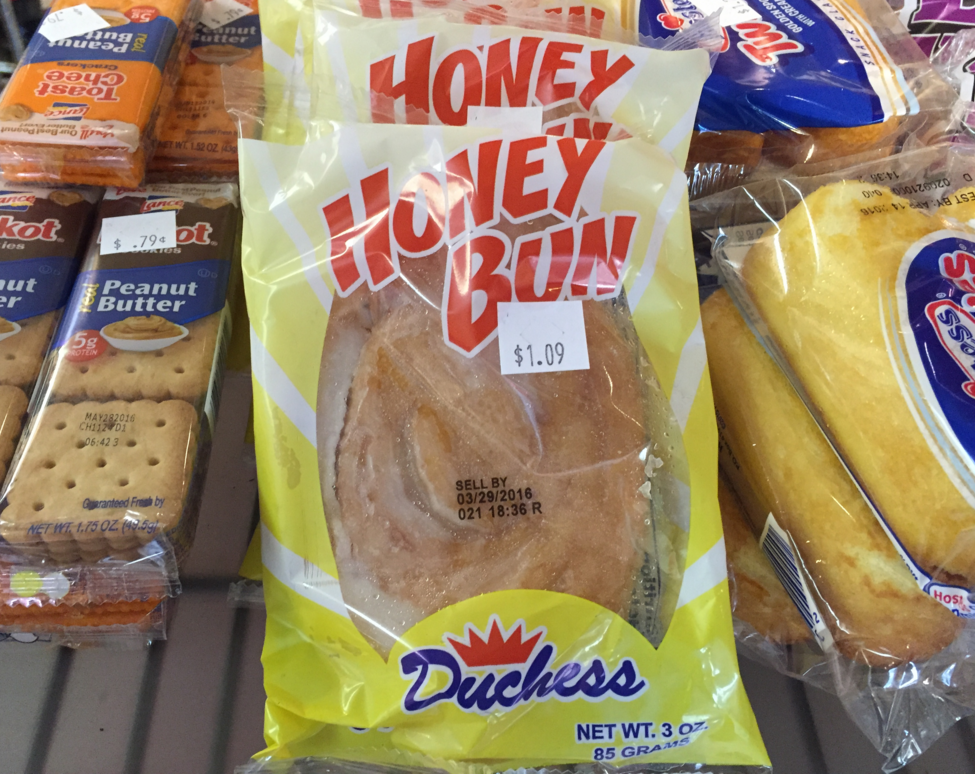The Secret Life of Honey Buns

A honey bun is a cake-y dessert that, as seen above, sells for about $1 at your deli. It’s nothing special, as pre-packaged desserts go, except perhaps for the fact that it’s pretty bad for you. The three-ounce honey bun pictured above runs 340 calories, 15 grams of fat, and 210 milligrams of sodium; that’s roughly the same as you’d get from one and a half Snickers bars. And that’s for the honey bun’s small version. Another brand, Freshley’s Grand Honey Bun, has an absurd 680 calories and contains 30 grams of fat for its jumbo variety. Then again, given what it is — fried dough with a sugary frosting — you’re not buying it because it’s good for you.
But you may not be buying it to eat it, either. If you’re purchasing it from the prison commissary, you may be buying it to sell, trade, or further criminal activity.
Honey buns are extraordinarily popular in prison, and particularly in the Florida penal system. According to a 2011 report in TIME, inmates in the state purchase about 270,000 Honey Buns a month, outpacing cans of Coke, tobacco products, and many other things commonly consumed on the outside. The popularity probably stemmed from the honey bun’s versatility in various prison recipes. For example, prison Legal News reported that some inmates use the pastries as the base of a makeshift birthday cake, one which “involves squeezing a peanut butter packet over the icing, topping that with crushed cookies, then applying a finishing touch of crushed peanut M&Ms or a melted chocolate bar.” Gawker notes that in North Carolina, honey buns were used to sweeten “wine” made from fermented orange juice. And, per the Tampa Bay Times, inmates in one Maryland prison have been known to use honey buns as a key ingredient in Christmas pies.
But there’s a grim, dark side to the honey bun biz. The Tampa Bay Times article linked above recounts stories of fraud, bribery, battery, and worse. A Florida bail bondsman, per the Times, allegedly funneled honey buns to inmates who could refer new business. There are stories of inmates in at least two states — Texas and Pennsylvania — trading honey buns for prescription drugs. In early 2010, two Florida inmates got into a fight over four honey buns — the unpaid debt from a lost Super Bowl bet — and one of the two men suffered facial injuries severe enough to warrant a hospital visit. And then there are the honey bun murders, as described by the Times:
In 2006, at the Kent County Jail in Michigan, inmate Benny Rochelle dragged his cell mate off the top bunk, killing the man, when he could not find his honey bun. And last year [2010], at the Lake Correctional Institution west of Orlando, two men were sentenced to life in prison for stabbing with crude shivs the man they thought had stolen shaving cream, cigarettes and a honey bun from their footlockers.
And even worse: In 2015, youth detention center officers allegedly bribed juvenile inmates with honey buns, asking them to beat up some other kids; one teen died in such an attack. The promise of honey buns, it seems, can give some inmates all the incentive they need to do terrible things.
There is, however, a good story in all this malaise. A Virginia inmate named George Alec Robinson was facing the death penalty, but due to the work of his attorneys was spared that fate. As the above-cited Prison Legal News recounted, he paid his lawyer with the only currency he had — honey buns. His lawyers told Prison Legal News that they appreciated the gesture and that “the [honey buns] were good, too.”
Bonus Fact: In some states, prisoners who violate prison rules are punished in the mess hall — they’re only given a concoction called Nutraloaf to eat. Nutraloaf is basically a blended-and-baked mix of whatever the prison has on hand, selected to make sure the inmate receives the proper amount of calories, etc., but without any regard to taste or texture. In other words, it’s gross. As the Huffington Post reported, using Nutraloaf as punishment is controversial, to say the least: “Prisoners in several states, including Illinois, Maryland, Nebraska, New York, and Washington, have even sued over Nutraloaf or its equivalent, claiming that the punitive food is so awful that it’s unconstitutional. Following a 2008 lawsuit in Vermont, the state’s supreme court ruled that inmates have to be given a hearing before Nutraloaf is doled out as punishment.”
From the Archives: Texas’s Last Last Meal: Why condemned inmates in Texas no longer get to pick their final menu.
Take the Quiz: Click the celebrities that have gone to jail.
Related: Honey Buns.
